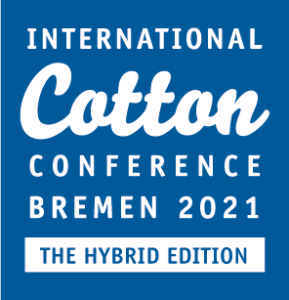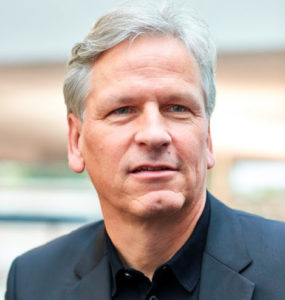 In Retrospect: Key topics from the 35th International Cotton Conference
In Retrospect: Key topics from the 35th International Cotton Conference
Sustainability in the textile supply chain is still a much-discussed subject. During the International Cotton Conference Bremen, the topic was addressed from different perspectives in various sessions. Two of the keynotes took a look at sustainability efforts in the textile chain from a retailer’s view.

Ms Nanda Bergstein,
Director of Corporate Responsibility of Tchibo, one of the ten largest retailers of clothing and textiles in Germany, talked about the company’s way to more corporate responsibility.

Mr Heinz Zeller,
Principal Sustainability, Hugo Boss, presented the sustainability strategy of the world-famous, premium-segment brand Hugo Boss.
Both speakers emphasized their efforts with regard to cotton.
Tchibo: Responsibility from Farmer to the Customer
Nanda Bergstein noted that a sustainable business must take responsibility from farmer to the customer. Tchibo tries to work within their own supply chains to empower people to drive change for themselves. The company lobbies for framework conditions and encourages innovation for improved sustainability.
Ms Bergstein said that activists had campaigned against Tchibo in the mid-2000s for labor rights violations in Bangladesh. Tchibo began working on sustainability issues and had participated in various initiatives in the years since, including the German Partnership for Sustainable Textiles and a commitment to pay living wages. Tchibo hopes to halve its CO2 emissions by 2030.
Tchibo is committed to sourcing 100 percent of its cotton from sustainable sources by the end of 2021, with sustainability defined as economically viable, optimized use of water, no use of hazardous pesticides, protection of biodiversity, social responsibility, and no use of GMO seeds. For cotton, Tchibo integrates certified materials such as organic or Fairtrade cotton, engages in supply chain farmer projects, and supports sector and multi-stakeholder initiatives. Tchibo pays premiums to farmers for organic cotton. She called for increased investment in farmers, and said it was important to educate consumers.
She said the company is looking to source non-GMO seeds from Turkey, India, and Pakistan.
She emphasized that consumers prefer organic products and that the costs of transition to organic production may be inhibiting increased production. In answer to a final question directed to Ms Bergstein, she agreed that polyester and other synthetic fibres have a problem with non-biodegradability. Tchibo is trying to use cotton as much as possible, to source pure cotton or synthetic garments to enable recycling, and to use recycled synthetic fibres where possible.
Hugo Boss: Focus on natural fibres
Mr Zeller emphasizes in his lecture that the motivation for sustainability starts with the consumer. According to a survey, consumers rate sustainability as the third most important factor when making purchase decisions. Capital markets, NGOs and shareholders are also pushing companies to incorporate sustainability into their business models. Digital tools enable companies to operate more efficiently, furthering sustainability goals.
The six strategic fields of action of Hugo Boss include preserving natural resources, creating a fair culture in the company, achieving joint responsibility with partners, creating new products with new ideas for tomorrow, promoting perspectives and creating value together. The company management of sustainability includes specific goals by department, clear guidelines, data collection and Key Performance Indicators tied to compensation. As of 2019, 61 percent of cotton was sourced from sustainable sources, 93 percent of goods came from highly-rated suppliers and 98 percent of suppliers had been trained in social responsibility and chemical management. The company is also reducing energy consumption, carbon emissions and water use.
Mr Zeller said that collaboration along the supply chain is necessary to achieve impacts. Hugo Boss will use point-of-sale labeling to facilitate conscious buying decisions. He said that suits made with traceable wool were the best-selling in Fall 2019. However, scalable IT solutions are missing. Traceability requires a large amount of data and results in higher costs all along the supply chain.
Mr Zeller said that cotton is still the most important fibre for Hugo Boss. He noted that cotton is a low-carbon fibre, especially when grown with regenerative practices. Hugo Boss needs high-quality cotton without contamination that is sustainably grown.
For 2021, Hugo Boss is emphasizing natural fibres, including linen, hemp, wool and of course cotton. In response to questions, Mr Zeller said that sustainable cotton is defined as cotton grown in an identity system, such as organic, BCI, CmiA, and Cotton Leads. He said that organic is becoming more important.
Hugo Boss uses synthetic fibres mostly in outerwear, which are not washed often and so do not cause much microfibre pollution.
The presentations and scientific papers provided by the speakers of the Bremen International Cotton Conference are available on the Bremen Cotton Exchanges website:

